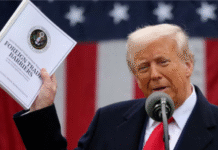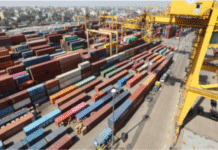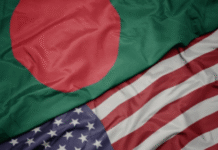
Coming out of Trump’s “America First” policy, US President Joe Biden is robustly engaging his allies in his global vision. After the virtual Leaders’ Summit on Climate in April, three months after taking office, he joined the G-7 summit in Cornwall, UK on June 11-13.
One day earlier on June 10, Biden and UK Prime Minister Boris Johnson signed a new version of the 80-year old “Atlantic Charter” aimed at strengthening the western alliance for democracy and human rights against autocratic rivals.
 For all latest news, follow The Daily Star’s Google News channel.
For all latest news, follow The Daily Star’s Google News channel.
In the G-7 summit, the leaders of the world’s wealthiest countries—Canada, France, Germany, Italy, Japan, the UK and the US—pledged more than 1 billion coronavirus vaccine doses for poorer nations in the next one year, help developing countries grow while fighting climate change and backing a minimum tax on multinational firms.
A significant part of the G-7 was taking a hard line against China, criticising Beijing for the “repression of Uyghur minority and other rights abuses”. The G-7 said it would continue to challenge “practices which undermine the fair and transparent operation of the global economy” while calling for “transparent, expert-led”, studies into the origins of the pandemic.
Biden also backed plans for “values driven” financing of infrastructure schemes for developing nations, which could rival China’s huge Belt and Road Initiative (BRI) meant to connect Asia with Africa and Europe via land and maritime networks.
The 30-member North Atlantic Treaty Organization (NATO) leaders who met in Brussels on Monday, where Biden was present, also declared that China presents a security risk.
Now, the question is, does the reinvigorated approach of Biden, G-7 or NATO bear any meaning for Bangladesh, or the region?
Foreign relation analysts say that the US returning to the global stage as a leader is certainly a welcome move, especially at a time when the world faces two major challenges—the coronavirus pandemic and climate change, of which Bangladesh is a major victim.
The world faced a crisis of democratic leadership during Donald Trump’s tenure, but Biden has moved to restore global cooperation by engaging the major powers and international bodies.
“Bangladesh, with a huge population, is desperately needing the life-saving commodity. And, the G-7 nations’ commitment of providing one billion vaccine doses to the poorer countries, as well as fighting climate change, is laudable,” said former foreign secretary Md Shahidul Haque.
As of now, Bangladesh availed only 7 million AstraZeneca vaccines from the Serum Institute of India, while India provided 3.03 million vaccines as gifts, but halted export of vaccines since March with its massive infections and deaths.
Troubled, Bangladesh is looking for vaccines from just about anywhere in the world—US, UK, Canada, Australia, Russia, China. China, meanwhile, has gifted 11 lakh vaccine jabs, and the country received only one lakh jabs from COVAX—a situation delaying the country’s inoculation campaign.
Bangladesh has also been demanding that Covid-19 vaccines be made a public good and for patent protections on it to be lifted.
The ray of hope came at the G-7 summit where Indian Prime Minister Narendra Modi’s proposal of lifting patent protections for the vaccine got support from South African President Cyril Ramaphosa, Australian Prime Minister Scott Morrison, WTO Director-General Okonjo Iweala and UN Secretary-General Antonio Guterres.
Shahidul Haque, also senior fellow at the South Asian Institute of Policy and Governance of North South University, thinks the patent issue will now be widely debated at the WTO. If the intellectual property rights is waved, it will be a good news for us and the world.
The global cooperation that was on the wane is now getting a new life, he observed, but added that the only downside of the G-7 summit is the absence of China and Russia and the move to counter China.
Bangladesh believes in friendship to all and malice to none. So, if the G-7 countries take any new move to help the developing countries build infrastructure, fight climate change, the scope for Bangladesh will get wider.
Thus far, China has been a major partner of infrastructure finance and technological assistance. If more western nations want to get involved in it, the options for Bangladesh and other developing countries will increase.
Bangladesh, however, needs to be very careful not to fall into the side of any alliance.
“Our government has made it clear we are with China-led BRI and US-led Indo-Pacific Strategy as long as these are for our social and economic development,” Shahidul Haque said.
Dhaka University International Relations Department Professor Lailufar Yasmin said the world needs vaccines on an urgent basis as poor countries are suffering the most, but how the vaccine will be supplied at the quickest has yet to be determined.
She thinks the “so-called China threat” from the G-7 was not so necessary. What is important is for global leaders to cooperate and coordinate, instead of creating rivalries. But if that does not happen, confrontational global politics may create a nightmare for all.
Professor Yasmin said that countries like Canada and Germany did not fully agree to the anti-China stance. That means, the G-7 also has no full consensus on what it wants in regard to China.
All the major global powers, including US, have huge trade relations with their so-called rival China, which is known as the world’s factory. Also, US and China are on the same page in terms of fighting climate change. From that perspective, Professor Yasmin doesn’t see it necessary for the US to wage an rivalry against China.
No country is perfect. The developed countries producing vaccines are also facing complaints of vaccine hoarding when the poor countries face supply shortage.
Former Ambassador Munshi Faiz Ahmad said if the US and its allies are suspicious about China, they should settle their issues through dialogue, which is more important than ever now as the world is facing a great challenge.
So, while it is important to promote democratic values, international rules and regulations, it is extremely important to be constructive, have dialogue and address the bilateral, regional and global issues with utmost care because the world is now sick and is in need of good care.
Porimol Palma is Diplomatic Correspondent of he Daily Star.










